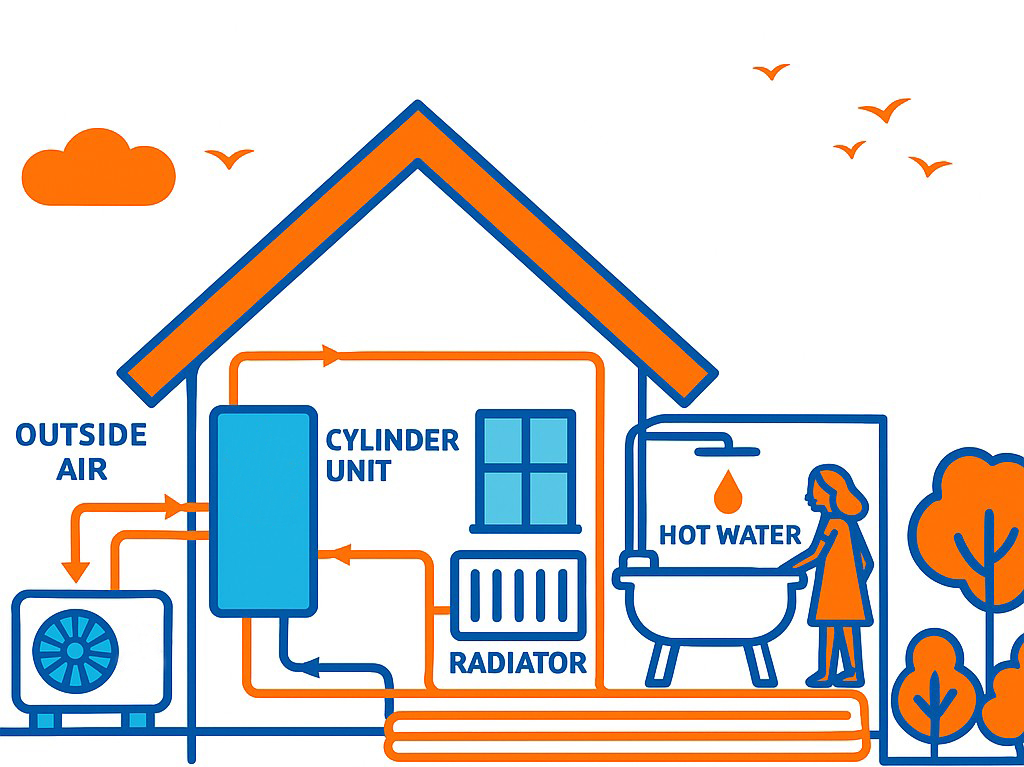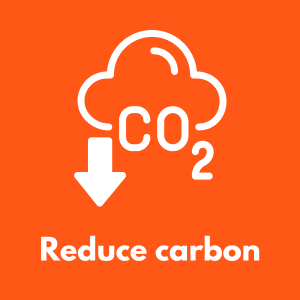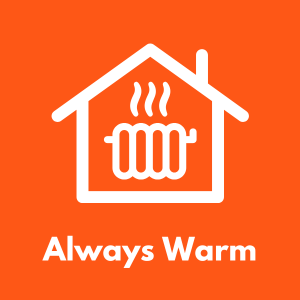What is a heat pump?
Heat pumps are highly efficient, renewable energy home heating systems. They transfer heat from one source location (soil, water or air) to another heating the radiators and hot water in your home.
A well designed heat pump system will keep you and your family warm even in the depths of winter and they’re perfect for the UK climate. They are quiet, easy to use, and don’t need much maintenance once installed.
The benefits of installing a heat pump:
- Heat pump grants – The government is currently offering a grant of £7,500 towards the cost of installing an air source heat pump for eligible households
- Highly efficient – Heat pumps can produce up to three units of heat for every unit they use. This and makes them highly efficient. (4).
- Long service life – an air source heat pump should last for 20+ years
- Versatile – Suitable for many types of homes, heat pumps provide both heating and hot water.
- Low carbon – Reduce your home’s carbon footprint by up to 44% compared to a gas boiler.

How does a heat pump work?

Heat pumps transfer existing energy from one place to another.
This is why they’re so efficient. This process can achieve over 300% efficiency, meaning 1kW of electricity can produce more than 3kW of heat. Here’s how the cycle works:
- A refrigerant circulates through an evaporator (similar to a car radiator)
- A fan draws air across the evaporator, transferring energy to the refrigerant
- This energy causes the refrigerant to boil and turn into vapour
- The vapour is compressed, which generates heat
- The hot vapour passes through a condenser, transferring heat to your home’s water circulation system
- The refrigerant then passes through an expansion valve, cooling it down for the cycle to begin again
The different types of heat pump

Ground source heat pumps
These systems extract heat from the ground via buried pipes filled with a water-antifreeze mixture. The pipes are installed either through deep boreholes or in shallow trenches with coiled “slinky” pipes.

Water source heat pumps
Instead of soil, these systems extract heat from water sources like aquifers, lakes, or rivers. They can use either closed loops (pipes) or open systems that draw water directly.

Air source heat pumps
These increasingly popular systems extract heat directly from outside air. A fan draws air over an evaporator coil containing refrigerant.
Myth busting heat pumps

Noise
You might be surprised by just how quiet an air source heat pump is.
Like any machine in operation, air source heat pumps do produce noise – it’s about the same as a whisper, the gentle hush of a library, or the sound of a breeze through leaves.

Radiators
You don’t always need to replace your radiators. We’ll identify if your current radiators are suitable for a heat pump is part of our design process. We’ll answer any questions you’ve got and help you with all the you need before going ahead. Don’t worry, we’ll guide you every step of the way.

Warm
Your heat pump will keep you warm every winter.
Your air source heat pump is perfect for the UK climate. It will still operate when outside temperatures are as low as -15°C. It may work a little harder but you will still be warm and cosy in your home.
Benefits of heat pumps
Air source heat pumps offer significant benefits compared to other methods of home heating.

Highly efficient
Up to 300% more efficient than a traditional boiler (4)

Grants
You could qualify for a £7,500 grant from the government (2)

Reduce carbon
Reduce carbon emissions by up to 70% (5)

Save money
Save up to £290 on your energy bills (6)

Always warm
Stay warm all year round with our Heat Pump Promise (7)
What our customers say
How much does a heat pump cost?

A heat pump could more affordable than you think.
There are a range of options available to you to help with the cost of your heat pump:
- The Government’s £7.5k Boiler Upgrade Scheme grant (eligibility checks apply).
- Finance options over 5 and 10 years with manageable monthly payments.
- Incentives from your mortgage provider.
Getting it right at the start of the process, means you’ll have a system you will be happy with that fits your needs.
Spread the cost with monthly payments
(Subject to status and affordability)
A finance package means you could spread the cost of your air source heat pump installation with manageable monthly payments. Below is an illustrative example of what your typical repayments could look like over 5 or 10 years.
Finance available at a fixed 0% or 9.9% APR, subject to status and credit check. The amount to be financed will vary depending on the heat pump required for your property and your chosen deposit.
Example
10-year finance plan monthly payments- Cash price: £11,499
- Government grant (BUS): £7,500
- Balance: £3,999
- Deposit (15%): £599.85
- Credit amount: £3,399.15
- Interest: £1,469.88
- Total amount payable (inc. deposit) £5,468.88
- Number of repayments: 120
- APR: 7.9%
- Monthly payment amount: £40.58
Example
5-year finance plan monthly payments- Cash price: £11,499
- Government grant (BUS): £7,500
- Balance: £3,999
- Deposit (15%): £599.85
- Credit amount: £3,99.15
- Interest: £699.88
- Total amount payable (inc. deposit): £4,698.95
- Number of repayments: 60
- APR: 7.9%
- Monthly payment amount: £68.32
Example
2-year finance plan monthly payments- Cash price: £11,499
- Government grant (BUS): £7,500
- Balance: £3,999
- Deposit (15%): £599.85
- Credit amount: £3,399.15
- Interest: £0.00
- Total amount payable (inc. deposit): £3,999
- Number of repayments: 24
- APR: 0%
- Monthly payment amount: £141.63
Important information
Finance is subject to eligibility, status, and affordability checks. UK residents aged 18 or over only.
Deposit required: minimum 15%, maximum 25%.
Prices shown include the Boiler Upgrade Scheme (BUS) grant, subject to eligibility and approval by Ofgem. We do not receive any commission or incentive for introducing you to our finance provider. You are free to choose your own finance option.
Failure to keep up with repayments may effect your credit rating.
CB Heating Ltd trading as EDF Heat Pumps is a company registered in England and Wales, Company number 09885603, Registered office, Nova North, 11 Bressenden Place, London, SW1E 5BY.
CB Heating Ltd trading as EDF Heat Pumps is also an Appointed Representative of Shermin Finance Limited, Company number 01276121, Registered office, HomeServe, Cable Drive, Walsall, England, WS2 7BN.
Authorised and regulated by the Financial Conduct Authority, FRN 727594. Shermin Finance Limited acts as a credit broker and is not a lender - they can introduce you to a panel of finance providers and do not charge fees for their Consumer Credit services.
Your questions answered
What is a heat pump?
Air source heat pumps (ASHP’s) are an innovative, highly efficient, renewable energy system. They heat your home and hot water using energy from the air outside even in the depths of winter. They are quiet, easy to use, and don’t need much maintenance once installed.
You can read an in-depth article about heat pumps here.
How much will a heat pump cost?
Every heat pump installation we carry out is specific to your home and your personal requirements. There are a wide range of factors that need to be taken into account before we can give you a dedicated quote.
Alongside the £7,500 Boiler Upgrade Scheme (eligibility checks apply) and any eligible finance options, a complete heat pump system could be closer than you think.
This will give you a dependable, robust, and eco-friendly heating system that will keep you warm for years to come. You can find the BUS scheme eligibility criteria here, but we’ll handle all the paperwork and applications, so it won’t be something you’ll have to worry about!
If you want read more about heat pump costs, then read on.
Will a heat pump lower my energy bills?
Installing an air source heat pump is a great start to lowering your energy bills.
You should also consider the following:
- Changing your electricity tariff to a dedicated heat pump tariff
- Installing solar panels and batteries on your property
- Ensuring your property is well insulated
You could save up to £290 a year on your energy bills if replacing an old G-rated gas boiler – and could see comparable energy bills if replacing a new A-rated gas boiler.
Will I need new radiators?
Not always, no but the performance of your heat pump system hinges on the compatibility and efficiency of your radiators.
Larger radiators with convectors are generally the best choice as they have a larger surface area. Careful evaluation and measurement of your existing radiators will ensure that your heating system operates at its best, providing comfort and energy efficiency.
We’ve written an extensive guide to Heat Pumps and radiators here.
Are heat pumps noisy?
If you’re concerned about how loud an air source heat pump is, you might be surprised to instead find out how quiet they are.
Like any machine in operation, heat pumps do produce noise – but how much noise they produce is remarkably low, especially with newer ASHP models designed with a focus on low-noise operation.
The noise is so low that it’s about the same as a whisper, the gentle hush of a library, or the sound of a breeze through leaves.
But if you’re curious to learn how a heat pump produces noise and how much noise it produces, read on.
Are heat pumps efficient?
Air source heat pumps are one of the most efficient heating systems for your home. Generating three times the amount of heat for every kw of energy used. Heat pumps are sustainable, low carbon and help you save energy.
Our in-depth article on Heat Pump efficiency can be found here.
Will a heat pump keep me warm in winter?
While we rarely have blazing hot summers in the UK, we also rarely have bitterly cold winters.
Your air source heat pump is perfect for the UK climate as it can work off-grid and will still operate when outside temperatures are as low as -28°C. It may work a little harder but you will still be warm and cosy in your home.
How much room will a heat pump require?
You’ll need to have space for the heat pump unit to be installed outside of your home.
This may be more challenging if you live in an apartment building. However, there is a lot of freedom over where we can put the unit if you have space. Remember, you will also need space for a hot water tank.
A well-designed and installed system will take all of this into account so you get the most out if your new air source heat pump.
Our Consultants will be able to answer any questions you have.
NOTES
Indicative pricing
1. The price above reflects the £7,500 government boiler upgrade scheme and is based on our lowest priced heat pump, cylinder and controls. The figure quoted does not reflect any radiator upgrades that may be required. Your individual quote will be specific to you and your requirements may rise depending on the system required to suit your home.
Boiler upgrade scheme
2. Eligibility checks apply. Visit the UK Government website for details: https://www.gov.uk/apply-boiler-upgrade-scheme
A typical customer can save £164 per year versus the current single-rate price cap tariff. This is based on the following;
3. Savings are based on a customer using Ofgem’s typical domestic consumption of 2700 kWh electricity and with heating provided by an ASHP with COP of 3.1 providing equivalent heat to that from a 94% gas boiler using 11,500 kWh of gas.
Save £260 per year
4. The Energy Saving Trust: Figures are based on fuel prices as of July 2025. Find out more about how we made these calculations. The running cost you can expect will depend on the size of your home, any heating system upgrade and any saving will also depend on the fuel type being replaced. You can expect the saving to range between old and new, depending on the age of your current heating system. https://energysavingtrust.org.uk/advice/air-source-heat-pumps/
Efficiencies
5. Heat Pump investment roadmap, UK Government https://www.gov.uk/government/publications/heat-pump-net-zero-investment-roadmap/heat-pump-investment-roadmap-leading-the-way-to-net-zero
The Heat Pump Promise
6. With our Heat Pump Promise if your heat pump doesn’t perform as promised, we’ll give you a refund. Terms & Conditions apply https://www.cbheating.co.uk/wp-content/uploads/2025/05/H3373-AW1-V3.pdf


